- Top
- Sustainability
- Overseas Initiatives
- Chinese Convenience Store Business
Chinese Convenience Store Business
Providing Safe and Reliable Products
In China, where concerns over food safety and reliability have been mounting, SEVEN-ELEVEN (BEIJING), SEVEN-ELEVEN (TIANJIN), and SEVEN-ELEVEN (CHENGDU) work to provide safe and reliable products by leveraging quality management and product development capacities cultivated in Japan.

Product Quality Management
For private brand products sold at SEVEN-ELEVEN (BEIJING), SEVEN-ELEVEN (TIANJIN), and SEVEN-ELEVEN (CHENGDU), we strive to maintain high quality levels by applying strict criteria to the selection of raw materials and screening manufacturing plants based on criteria such as experience exporting to Japan.
● Introduction of Quality Management System
Factories that manufacture only private brand products are strengthening quality control by adopting international systems for food safety management and measures taken at Japanese factories. SEVEN-ELEVEN (BEIJING) and SEVEN-ELEVEN (TIANJIN) manufacturing factories, Beijing Wang-Yang Foods and JEANAVICE Factories, obtained "SC" food production license for chilled food in January 2017, earlier than their peers. SC is a Chinese law regarding food production that must be obtained by October 2018, switching from the previous "QS" food quality and safety license. In addition, Beijing Wang-Yang Foods obtained HACCP*1 certification in March 2018. Beijing Want-Yang Foods began conducting ATP wipe inspections in November 2021, and is working to manufacture safer and more secure products. In October 2021, additional pillow wrapping machines were introduced, and burgers and rolls that were previously manufactured by hand are now being converted to pillow wrapping. Moreover, the JEANAVICE Factory acquired ISO 22000 (food safety management systems) in March 2022.
SEVEN-ELEVEN (CHENGDU) also asks its suppliers to comply with its own standards, which are stricter than domestic laws and regulations, and also holds regular quality control workshops for store employees to ensure safety and security. Chengdu Xinshuwei Food Limited Company, which supplies products to SEVEN-ELEVEN (CHENGDU), acquired FSSC 22000 (food safety system) certification in February 2024.
- *1 Abbreviation for Hazard Analysis and Critical Control Point. Food sanitation management methods for ensuring food safety.
●Automation of Production Processes
SEVEN-ELEVEN (BEIJING), SEVEN-ELEVEN (TIANJIN), and SEVEN-ELEVEN (CHENGDU) are automating their manufacturing processes to further stabilize the taste and quality of their products. For example, Chengdu Xinshuwei Food Limited Company expanded the installation of rice ball molding and packaging machines in July 2018 and adopted noodle-making machines in 2019. In 2020, the company is expanding its cooking facilities and continuing to implement the offering of completely new and unique products in addition to improving quality. In addition, Beijing Want-Yang Foods has mechanized its cooked bread manufacturing plant, which began full-scale operations in March 2019, focusing on the bread-making process and product packaging.
Furthermore, SEVEN-ELEVEN (CHENGDU) is working on activities to help improve the temperature control level and safety of its products by enhancing its cooling facilities and in-place cooling system to ensure product safety. At the same time, it holds monthly workshops to improve product quality and stability for the production management and other departments. SEVEN-ELEVEN (TIANJIN) has also been selling salads using the cold chain since July 2019.
In addition to these, the manufacturing factory, Lu Mei Foods, introduced a noodle production machine and an egg peeling machine in 2024, improving quality while also increasing production efficiency and reducing costs. Wang-Yang Foods also introduced a molding machine for "big rice balls" and began selling a new product, "Da Fantuan."
Giving Consideration to Health
Trans-fatty acids, which are said to increase the risk of heart disease, were successfully reduced to zero in the original room-temperature bread products of SEVEN-ELEVEN (BEIJING), SEVEN-ELEVEN (TIANJIN), and SEVEN-ELEVEN (CHENGDU). In addition, since January 2019, allergens have been displayed for rice balls and sushi, and this is gradually being expanded to boxed lunches, sandwiches, and other daily food products.
SEVEN-ELEVEN (BEIJING) has displayed calories on the front of packages for some of its sandwich and salad products since the second half of the fiscal year ended February 28, 2022, and also began releasing room temperature bread from the Zero Sugar series in April 2022. Furthermore, SEVEN-ELEVEN (TIANJIN) launched lunchboxes such as cereal rice and salads rich in vegetables under the theme of health from the second half of the fiscal year ended February 28, 2021. In addition, Beijing Wang-Yang Foods, which supplies products to the SEVEN-ELEVEN (BEIJING) and SEVEN-ELEVEN (TIANJIN) areas, introduced a sandwich slicer in 2023 as a labor-saving and anti-microbial measure and, in 2024, introduced a label analyzer to save labor in product name and thermal label management and to prevent errors.
Also, since August 2025, some products are sold with three different labels—“low calorie,” “high protein,” and “low fat”—to meet customer health needs.

Improving Customer Satisfaction
SEVEN-ELEVEN (BEIJING), SEVEN-ELEVEN (TIANJIN), and SEVEN-ELEVEN (CHENGDU) are working to collect customer feedback in order to improve products and services from the standpoint of customers. Feedback obtained from customers is shared with departments and stores on a daily basis. In addition, in order to grasp changes in customer needs and reflect them in products, SEVEN-ELEVEN (BEIJING) and SEVEN-ELEVEN (CHENGDU) conduct periodic customer surveys. Further, SEVEN-ELEVEN (TIANJIN) held a product exhibition in September 2024. At the exhibition, food tasting of new products and questionnaire surveys on future needs and so on were conducted to use for product development.
In addition, SEVEN-ELEVEN (BEIJING), SEVEN-ELEVEN (TIANJIN), and SEVEN-ELEVEN (CHENGDU) have been conducting training to further improve the customer service provided by employees. In the fiscal year ended February 29, 2024, SEVEN-ELEVEN (CHENGDU) implemented the following its number of new initiatives to improve customer satisfaction.
1. Sharing of basic training information: Preparation and monthly distribution to stores of materials focusing on social information, in-store standards, food safety management, outstanding case studies from other stores, product information, and promotion measures.
2. Video of employees serving customers is recorded and a trainer uses the videos at the respective stores to conduct training. Ten stores identified as having outstanding customer service were given awards at the end of the fiscal year ended February 29, 2024.
SEVEN-ELEVEN (CHENGDU) conducted training in 2024 to expand delivery sales. Training was conducted at all stores on basic system operation, rules for product preparation, measures to enhance business operation levels, and other topics. In day-to-day management as well, low evaluation reviews from individual customers at each store were selected and organized into a “Delivery Review Report” to improve issues regarding customer services in delivery sales at each store.
Furthermore, SEVEN-ELEVEN (BEIJING) created customer service awards to recognize employees who provide outstanding customer service. The awards are presented in a group ceremony every three months. We will strive to enhance motivation by presenting awards to recipients at meetings and other such forums in conjunction with striving to increase case studies of best practices for employees to follow by making the award-winning activities widely known. In the fiscal year ended February 28, 2025, awards were presented to 39 employees.
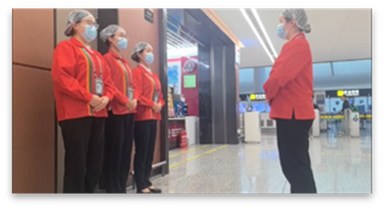
Thriving with Local Communities
SEVEN-ELEVEN (BEIJING), SEVEN-ELEVEN (TIANJIN), and SEVEN-ELEVEN (CHENGDU) each conducts social contribution activities as members of their local communities.
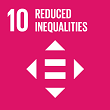
Environmental Preservation Measures through Storefront Donations
SEVEN-ELEVEN (BEIJING) installed donation boxes in stores and has been collecting money from customers since November 2006. The funds are donated to the Beijing Green Fund, an officially-recognized environmental preservation organization. The collection boxes are placed on register counters, and for each cup of coffee purchased, 0.01 yuan has been donated since 2018.
Donations to the Fund were continued in 2024, and the total amount donated to the Fund during the year was 27,363.95 yuan. Donations from coffee purchases were 25,158.28 yuan, and 2,205.67 yuan was contributed in cash to the donation boxes.
SEVEN-ELEVEN (BEIJING) and the Beijing Green Fund will continue their cooperation for the public good centered on tree planting in Beijing based on the principle of “sharing resources, complementing strengths, achieving win-win outcomes, and developing together” in an effort to contribute to environmental preservation in Beijing while building a long-term, stable cooperative relationship.
Donation amounts to Beijing Green Fund (Chinese Yuan)
|
FY2021 |
FY2022 | FY2023 | FY2024 |
|---|---|---|---|
| 51,231 | 35,570 | 33,695 | 28,856 |
Support for People with Disabilities
In 2023, SEVEN-ELEVEN (CHENGDU) donated household goods and other items to residents with disabilities in the Wuhou District of Chengdu. This initiative was well received, with the company receiving a letter of appreciation from the government in acknowledgement. In 2024, the company again donated gift cards to Wuhou District residents with disabilities.
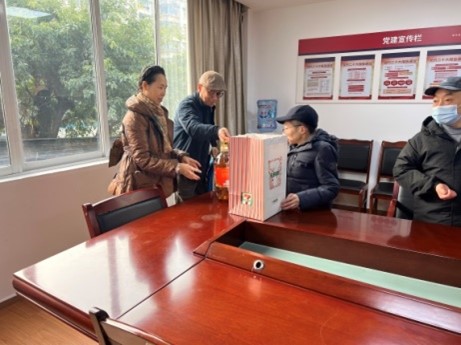
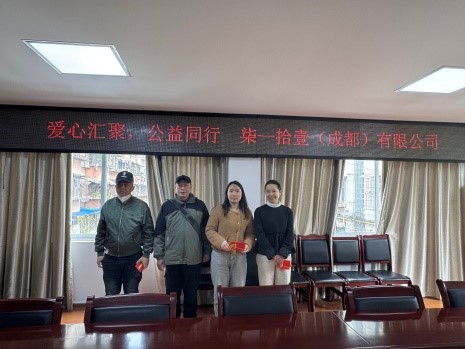
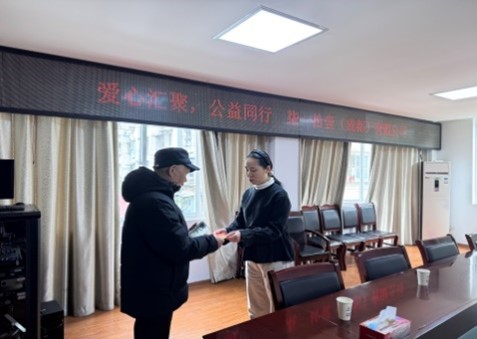
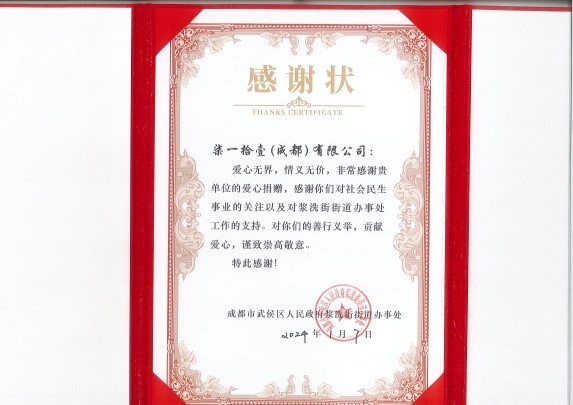
Value of Goods Donated to Persons with Disabilities by SEVEN-ELEVEN (CHENGDU) (Chinese Yuan)
| FY2021 | FY2022 | FY2023 | FY2024 |
|---|---|---|---|
| 1,891 | 0 | 1,993 | 2,000 |
Creating Fulfilling Workplaces
In continuing to expand our network of stores in China, it is essential that we hire and train local employees. SEVEN-ELEVEN (BEIJING), SEVEN-ELEVEN (TIANJIN), and SEVEN-ELEVEN (CHENGDU) seek to raise the communication abilities of employees and develop them to be able to think and act by themselves. To this end, the three companies are working to provide various training seminars and create workplaces where employees are able to demonstrate their abilities to the fullest.

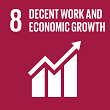

Employee-Related Data (FY2024)
| SEVEN-ELEVEN (BEIJING) | SEVEN-ELEVEN (TIANJIN) | SEVEN-ELEVEN (CHENGDU) | |
|---|---|---|---|
| Full-time employees (Men/Women) | 333(162/171) | 153(50/103) | 120(37/83) |
| Part-time staff | 225 | 81 | 58 |
| Percentage of employees with disabilities | 4.92% | 2.61% | 4.61% |
Employee-Related Data (FY2023)
| SEVEN-ELEVEN (BEIJING) | SEVEN-ELEVEN (TIANJIN) | SEVEN-ELEVEN (CHENGDU) | |
|---|---|---|---|
| Full-time employees (Men/Women) | 339(170/169) | 146(49/97) | 116(37/79) |
| Part-time staff | 257 | 85 | 41 |
| Percentage of employees with disabilities | 4.92% | 2.74% | 4.62% |
Employee-Related Data (FY2022)
| SEVEN-ELEVEN (BEIJING) | SEVEN-ELEVEN (TIANJIN) | SEVEN-ELEVEN (CHENGDU) | |
|---|---|---|---|
| Full-time employees (Men/Women) | 338(174/164) | 143(52/91) | 121(39/82) |
| Part-time staff | 229(91/138) | 122(58/64) | 24(7/17) |
| Percentage of employees with disabilities | 4.92% | 3.50% | 2.07% |
Employee-Related Data (FY2021)
| SEVEN-ELEVEN (BEIJING) | SEVEN-ELEVEN (TIANJIN) | SEVEN-ELEVEN (CHENGDU) | |
|---|---|---|---|
| Full-time employees (Men/Women) | 338 (178/160) | 154 (58/96) | 145 (47/98) |
| Part-time staff | 359 | 75 | 65 |
| Percentage of employees with disabilities | 3.10% | 3.05% | 1.43% |
Support for Enhancing the Abilities of Employees
Operations Field Consultants (OFC) play an important role in connecting the Head Office with franchise store owners. They serve as store management consultants that provide multifaceted advice to franchise stores on overall management, including ordering, product lineups, and employee training. OFC candidates first gain store experience at training stores and learn the fundamentals of store management, which include the Four Basic Principles; unit control; employing, training, assigning and evaluating of staff; and management indicators.
SEVEN-ELEVEN (BEIJING) conducts third-party quality control surveys to enhance daily management and continuously implements measures that lead to store improvements. The status of store operations is ascertained through third-party organization evaluations and rankings, and the results are shared with OFCs. OFCs then work to improve store operations by using the indications and other information in the evaluations as issues for improvement.
To recruit and systematically develop outstanding OFC candidates with potential at an early stage, SEVEN-ELEVEN (TIANJIN) has been collaborating with three universities in Tianjin since 2024 and started recruiting activities targeting prospective graduates of four-year universities. As a result of these efforts, six employees were recruited, and their development as OFC is being supported in accordance with a rapid OFC development plan.
In the fiscal year ended February 29, 2024, SEVEN-ELEVEN (CHENGDU) organized monthly training to enhance the counselling skills of OFCs. Classroom training on four topics was provided through 12 courses, supporting the improvement of OFC counselling abilities.
In the fiscal year ended February 28, 2025, to ascertain the status of acquisition of basic skills and knowledge by store employees, the company conducted job skills tests for employees at all stores. Based on the results, it provided training to employees with lower skill and knowledge acquisition levels in an effort to raise overall levels of all store employees. Specifically, training teams were selected from 30% of stores in each month, with one person per store taking the test. Training sessions were conducted for those employees who scored below 80 points on the test, failing to meet the basic standards. The test covers cleanliness, customer service, processing and sales of FF products, customer service skills for cashiers, product display, and delivery services operations. The average score in December 2024 improved by 16% compared to January 2024, and the improvement in employees’ basic operational abilities has led to sales growth.
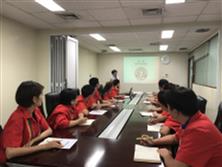
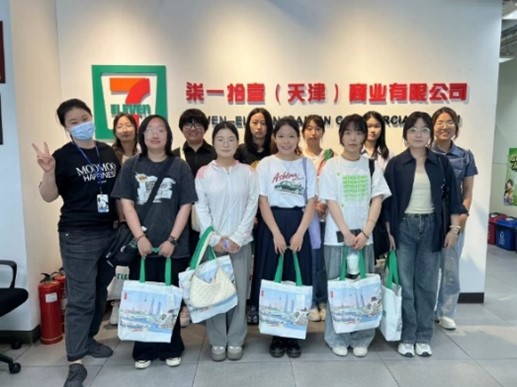
New employees selected as OFC candidates
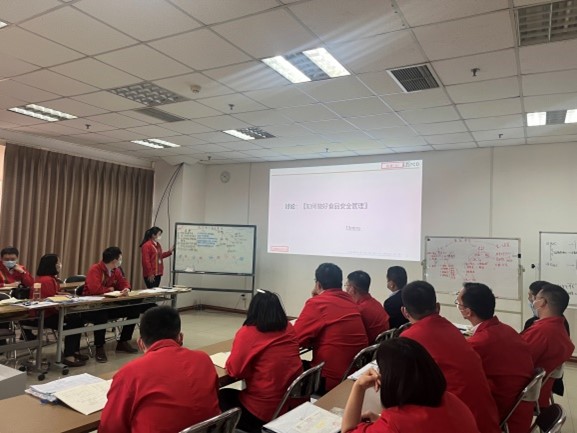
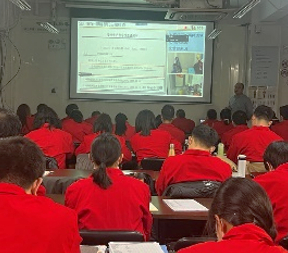
OFC counselling abilities enhancement training
Programs to Raise Employee Motivation
SEVEN-ELEVEN (BEIJING), SEVEN-ELEVEN (TIANJIN), and SEVEN-ELEVEN (CHENGDU) implement various initiatives to raise employee motivation and resolve issues they may face in the workplace. SEVEN-ELEVEN (TIANJIN) and SEVEN-ELEVEN (CHENGDU) have, for example, instituted internal hiring programs that allow employees to apply for desired positions, with selection made through interviews between candidates and Head Office departments as well as the Human Resources Department.
In 2024, the 20th anniversary of the establishment of SEVEN-ELEVEN (BEIJING) was commemorated by holding multiple events including interviews of veteran employees with at least 15 years of continuous service, a photo contest with “Seven-Eleven as I See It” as the theme, and large-scale collection of past products. In addition, a series of activities was organized in a pamphlet that was distributed to employees as a commemorative item. More than 50% of employees participated in these events, leading to stronger employee engagement. Employee eagerness to actively participate was confirmed throughout the planning and implementation, and the company is conducting further enhancement of personnel measures.
SEVEN-ELEVEN (TIANJIN) relocated its Head Office when the lease for previous site expired in August 2024. As a result, employee commuting conditions and the work environment improved and employee satisfaction increased. In addition, the company conducted a major review of its employee health insurance as a part of its employee benefit programs, and in addition to the standard health insurance, private health insurance was also introduced, reducing employee healthcare expense burdens. Health checkups were also improved, with tests being conducted at public hospitals rather than general health checkup centers, resulting in more reliable and accurate checkup results.
In addition, in the second half of the fiscal year ended February 28, 2025, SEVEN-ELEVEN (TIANJIN) introduced the Chairperson’s Award and Innovation Award, new employee commendation programs. Employee motivation is being enhanced by recognizing outstanding employees who achieve results through their day-to-day efforts.
SEVEN-ELEVEN (CHENGDU) began conducting monthly internal workshops and employee group birthday parties in 2023 to raise employee motivation, and these programs were continued in the fiscal year ended February 28, 2025 as well.
Examples of programs for raising employee motivation
- Operate a contact desk so that employees can consult with the company on issues
- Interviews with employees by human resources departments
- Interviews with new employees by supervisors
- Organize employee meetings to promote closer interaction and socialization
- Conduct questionnaires on motivation
- Commend excellent employees and share information on role models
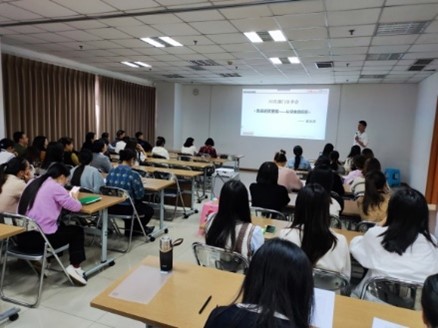
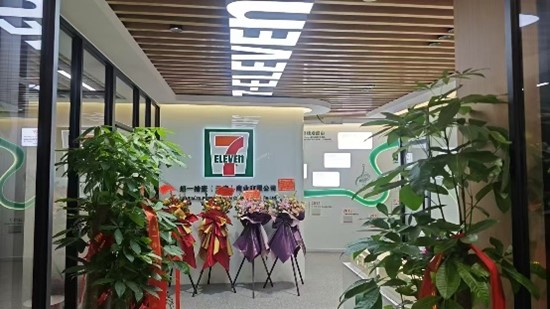
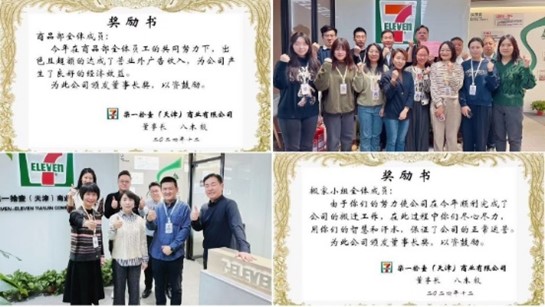
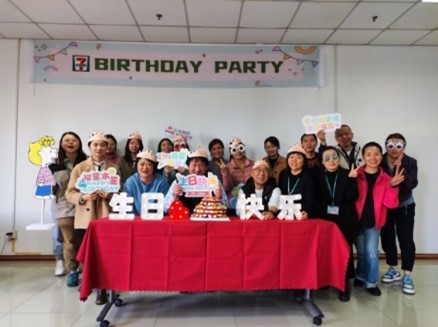
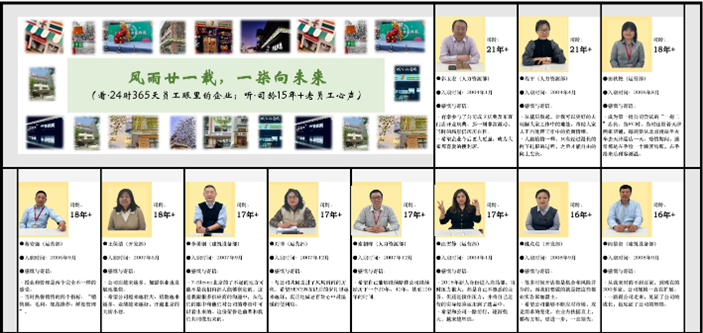
Fair Evaluation and Remuneration
SEVEN-ELEVEN (BEIJING), SEVEN-ELEVEN (TIANJIN), and SEVENELEVEN (CHENGDU) have adopted an employee evaluation system that combines monthly interview evaluations and yearly evaluations. Monthly interviews are conducted between employees and their direct supervisors to discuss the rate of progress toward their performance goals. In addition, once each year, after self-assessments are carried out by each employee, interviews and evaluations are then conducted by the direct supervisor and a secondary, higher-level supervisor. Monthly evaluations are based on company, divisional, and individual performance. For managers who conduct evaluation, education is carried out so that they can evaluate subordinates properly and develop human resources.
SEVEN-ELEVEN (TIANJIN) modified its self-check assessment system for Head Office employees in 2024. The self-check assessments, which had been conducted quarterly to help individual employees improve work efficiency, were changed to a semiannual basis and performance review meetings regarding employee development and guidance were increased from once annually to twice annually. Also, based on the results of the self-check assessments, a system to increase monthly salaries for employees who achieve excellent results was introduced in an effort to enhance employee motivation.
SEVEN-ELEVEN (CHENGDU) supplemented the semiannual and annual evaluation systems for all employees by establishing a separate monthly evaluation system for sales staff and managers at the supervisor level and below. In the semiannual and annual evaluations, after employees conduct self-assessments, each supervisor unifies the evaluation criteria and performance improvement plans and communicates the final evaluation results in meetings. The company conducts training to ensure that supervisors could properly evaluate their subordinates and foster talent development while maintaining fairness, impartiality, and consistency in evaluation standards. It also changed its company structure and evaluation system in the fiscal year ended February 29, 2020. Starting from the fiscal year ended February 28, 2021, managers are evaluated and interviewed every quarter, while non-managers are evaluated monthly. Also, the Employee Rules were revised in 2021 to clarify individual career paths and increase the granularity of the personnel evaluation system. In the fiscal year ended February 28, 2023, KPI and GS (conduct) were added to the individual performance indicators based on the existing performance evaluation system. An annual bonus evaluation system centered on performance was also created by linking company performance with individual performance. In 2023, the evaluation items and evaluation criteria for the competency evaluation were reviewed and granularity increased, on a trial basis with OFCs and MDs, with the aim of achieving more objective and impartial evaluation criteria. In the fiscal year ended February 28, 2025, the competency evaluation items and criteria for each layer at the Head Office were revised based on the results of trial evaluations conducted in the previous fiscal year for OFC and MD using new items and criteria. The company also made improvements and standardized evaluation form formats, evaluation frequency, results sharing processes, performance improvement plans based on supervisor guidance, and other matters.
Promoting the Advancement of Women
In China, the labor contract laws have been designed to provide male and female employees with generous leave related to childbirth and childcare. Moreover, men and women are treated equally, and it is common for women to continue working after marriage. This legal system and the practice of appointing managers based on the ability to work together support the appointment of women to managerial positions at each company. SEVEN-ELEVEN (TIANJIN) appointed its first female Chinese director in 2012. As of December 31, 2021, women currently occupy approximately half of the nonexecutive managerial positions at SEVEN-ELEVEN (BEIJING), SEVEN-ELEVEN (TIANJIN) and SEVENELEVEN (CHENGDU). In March 2018, SEVEN-ELEVEN (BEIJING) appointed women in the roles of vice president and director, and SEVEN-ELEVEN (TIANJIN) appointed a woman as director.
At the end of June 2025, the total number of managers at SEVEN-ELEVEN (BEIJING) was 29 (manager and above), of which 18 were women, to maintain a level of more than half of all managers, at 62%.
As of the end of 2024, SEVEN-ELEVEN (TIANJIN) had 18 female managers (team leader or higher), and the percentage of women in managerial positions was 56.3%.
Internships
SEVEN-ELEVEN (BEIJING) is making maximum use of a University Information Map and started new collaboration with one school. As a result, the company recruited 39 interns in 2024, enhancing the human resources necessary for business operations. As of the end of June 2025, 6 of 26 directly managed store managers are former interns, accounting for 23% of the total. Also, 21 of 57 members of the operation ZO team are former interns, representing 37%, making interns the foundation of the company’s human resource base. Based on these achievements of the internship program and seeking further talent development and improved selection accuracy, in 2025, SEVEN-ELEVEN (BEIJING) analyzed and identified the characteristics of existing outstanding personnel to build a systematic interview methodology. The company is now working to improve the accuracy of hiring decisions and retention rates in recruiting talent to support its future franchise business.
With the aim of hiring outstanding human resources, hiring local personnel, and promoting the education of youth, SEVEN-ELEVEN (TIANJIN) and SEVEN-ELEVEN (CHENGDU) conduct internships and have been recognized by the government as Youth Employment Intern Bases that promote the employment of young people who have graduated from high school. SEVEN-ELEVEN (TIANJIN) accepted 39 interns in the fiscal year ended February 28, 2022, 4 of whom were employed by SEVEN-ELEVEN (TIANJIN). In the fiscal year ended February 28, 2023, it accepted 33 interns, 6 of whom became full-time employees. Of the 4 interns who became full-time employees in the fiscal year ended February 28, 2021, 2 have already been promoted to OFC. In the fiscal year ended February 28, 2025, 32 interns were accepted, of which 6 becomes full-time employees. SEVEN-ELEVEN (CHENGDU) accepted 14 interns in the fiscal year ended February 28, 2021, 4 of whom were hired by SEVEN-ELEVEN (CHENGDU) in July 2021. It accepted 3 interns in the fiscal year ended February 29, 2024 and 7 interns in the fiscal year ended February 28, 2025.
Reducing Environmental Impact
The Chinese government has been putting great emphasis on climate change issues. In Beijing, companies with annual CO2 emissions in excess of 5,000 tons are subject to upper limits on CO2 emissions in each industry as major emitters and must purchase emissions credits for the excess portions.
In the fiscal year ended February 28, 2025, SEVEN-ELEVEN (BEIJING), which is subject to this program, reduced its emissions by 1,295 tons compared to the previous fiscal year to 10,411 tons. The company is achieving a certain degree of results through efforts to conserve energy and reduce emissions. SEVEN-ELEVEN (TIANJIN) and SEVEN-ELEVEN (CHENGDU) also reported higher electricity consumption due to an increase in the number of stores, new installations of refrigeration and freezer devices, and so on.
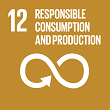

Environment-related Data
SEVEN-ELEVEN (BEIJING)
SEVEN-ELEVEN (BEIJING)
| FY2019 | FY2020 | FY2021 | FY2022 | FY2023 | FY2024 | |
|---|---|---|---|---|---|---|
| Number of stores | 275 | 283 | 304 | 317 | 331 | 362 |
| Electricity consumption(MWh) | 29,773 | 24,251 | 25,171 | 20,598 | 19,381 | 17,237 |
| Water Consumption(1,000m3) | 94 | 78 | 55 | 47 | 39 | 36 |
SEVEN-ELEVEN (TIANJIN)
| FY2019 | FY2020 | FY2021 | FY2022 | FY2023 | FY2024 | |
|---|---|---|---|---|---|---|
| Number of stores | 178 | 179 | 200 | 209 | 217 | 232 |
| Electricity consumption (MWh) | 20,051 | 17,552 | 17,898 | 20,440 | 22,958 | 22,600 |
| Water Consumption (1,000 m3) | 57 | 49 | 50 | 44 | 56 | 50 |
SEVEN-ELEVEN (CHENGDU)
| FY2019 | FY2020 | FY2021 | FY2022 | FY2023 | FY2024 | |
|---|---|---|---|---|---|---|
| Number of stores | 75 | 73 | 84 | 85 | 77 | 82 |
| Electricity consumption (MWh) | 9,720 | 7,631 | 8,491 | 8,748 | 7,220 | 7,547 |
| Water Consumption (1,000 m3) | 24 | 24 | 27 | 24 | 17 | 19 |
Energy Conservation Measures at Stores
Starting around mid-2024, SEVEN-ELEVEN (BEIJING) has focused on chilled cases, which account for a large portion of electricity consumption in stores, and began testing the introduction of energy-saving curtains to prevent cold air loss in an effort to reduce electricity usage. Measurement data from the initial four test stores confirmed energy-saving effect of approximately 19% during the summer. It also verified changes in sales resulting from installing curtains over a certain period, but the installation of curtains had no impact on sales. Based on these results, the company gradually expanded the number of stores where curtains are installed, implementing them in approximately 40 stores in Beijing and Hebei Province. The energy-saving effect is estimated to be approximately 6,000 kWh per store annually, with electricity costs expected to be reduced by about 9,000 yuan. Testing is currently ongoing, and the company is also verifying the durability and impact on work efficiency of the curtains. After confirming the energy-saving effect and practicality, it plans to proceed with expanded implementation.
SEVEN-ELEVEN (TIANJIN) installed 106 fast food refrigerated cases and inverter outdoor units at 24 stores in the fiscal year ended February 28, 2025, further promoting energy conservation in stores.
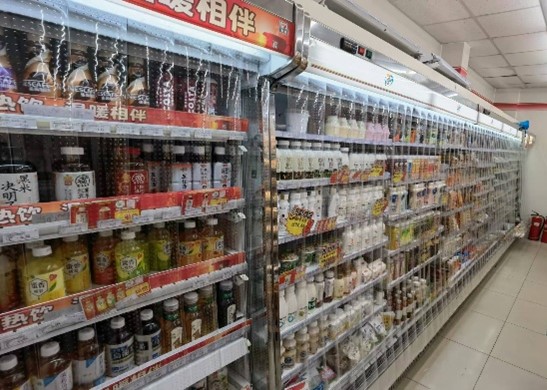
Environmental Measures at Food Manufacturing Factories
In order to avoid wasting resources, efforts are being made at Beijing Wang-Yang Foods, a food manufacturing factory of SEVEN-ELEVEN (BEIJING) and SEVEN-ELEVEN (TIANJIN), to utilize food loss generated by each factory as feedstock for a pig farm. Similarly, the JEANAVICE Factory has a contract with a fish farm to collect residual bread. Both factories use wastewater treatment facilities that clean water to the same or higher standard than government standards to ensure that polluted water is not discharged, collect waste oil, and conduct periodic investigations of smoke emissions from the perspective of preventing atmospheric pollution.
Furthermore, to save energy, JEANAVICE Factory works to reduce thermal loss from boilers and reduce the consumption of gas.
